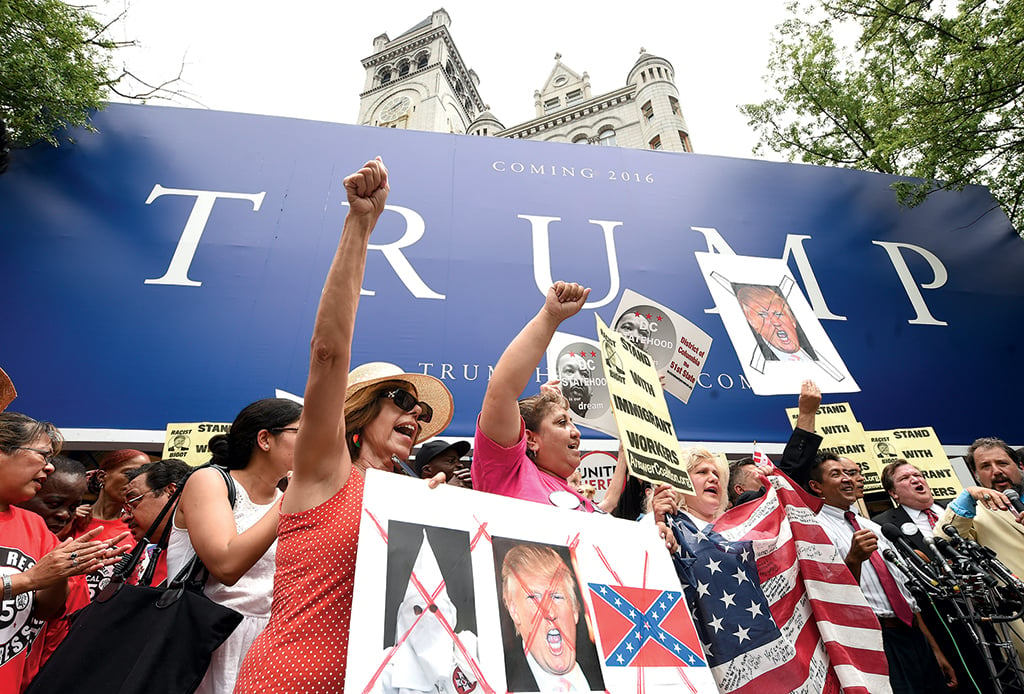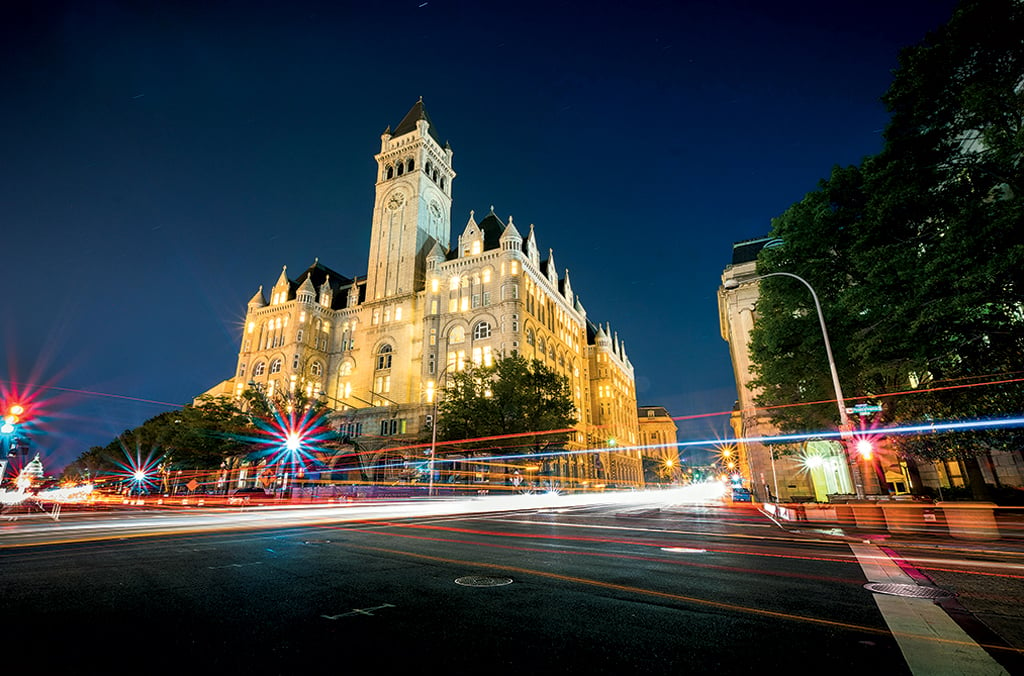Well before the Trump International Hotel opened in the Old Post Office building Monday, publicists were touting its lavish guest quarters: the thick wool carpets, the six-foot-long bathtubs, the 16-foot ceilings.
People who run hotels, though, know that as nice as it is to fill a place with guests paying $575 a night, a lot of the real money—40 percent, by some estimates—gets made downstairs in the ballroom. That’s especially true in Washington, which hosts more than 1,000 conferences, meetings, and trade shows a year.
The Trump hotel, in fact, is built to capitalize on the gala-and-gathering economy. While the city has plenty of nice accommodations, it has nothing quite as grand as the Trump’s Presidential Ballroom, a 13,200-square-foot wonder that combines the building’s original Romanesque Revival architecture with Trumpian glitz.
Then there’s the matter of the name on the front door, welcome mats, side of the building, and wherever else those five letters fit.
When the Trump Organization secured the Old Post Office building, its brand was associated with glamour, high-end amenities, and strong customer service. Now, after more than a year of Donald Trump’s presidential campaign, the name connotes bigotry, bluster, and erratic behavior. That has industry analysts thinking the hotel may have been damaged goods before it opened. “Planners are trying to put events in places where they’ll be successful and draw attendance,” says Tom Hazinski, managing director at the hospitality-industry consulting firm HVS. “If there’s anything out there—whether real or perceived—that would somehow damage the performance of the event, they’ve got other options to look at.”
It’s all about incentives. Let’s say you’re the Joneses, a well-to-do Seattle couple planning a DC trip. Maybe you don’t have strong feelings about Trump, in which case you book a room. Or you figure your puny little decision about a weekend stay won’t make much difference, so you book a room anyway. Even if you don’t, you’re still just two of more than 21 million tourists visiting DC this year. On the other hand, let’s imagine you’re putting together an event—an innocuous, apolitical gathering for, say, an orthodontists’ trade group. Unlike the Joneses, you need to please a few thousand attendees. Even if 99 percent of them don’t care about associating their dental-appliance awards banquet with Trump, it takes only a handful to make a stink—and maybe complain to the people who sign your paycheck. Why risk it? Especially because you know you’ll be blamed if the event winds up under-attended.
“You could have some section of your delegates loudly disfavoring your decision—either complaining with their feet by not attending or complaining to their board,” says consultant Hans Detlefsen.

Big conferences are often planned years in advance, so it’s too soon to tell if Trump’s campaign has hurt the hotel. But established Trump properties elsewhere have taken a hit. Revenue per available room—a metric the industry uses to gauge performance—at the Trump International Hotel and Tower in Chicago was down by 17 percent through June compared with the same period in 2015. The hotel market as a whole there gained 9 percent. “I don’t know of any other explanation than the controversy from his campaign why his hotel would be underperforming,” Hazinski says.
Trump’s DC hotel might overcome election-year ugliness thanks to sheer demand. Associations are the area’s third-largest employer, and a lot of them hold conferences here. The District alone hosted 1,057 conventions, meetings, and trade shows last year; the Trump’s 38,000 square feet of event space represents much-needed relief for a stretched inventory. (It may be too much relief: In a recent deposition, Donald Trump Jr. expressed doubts about converting a canceled restaurant into more meeting space.) For the most part, price is far more important than the hotel brand, says Amy Ledoux of the American Society of Association Executives. (Ledoux’s group considered holding a meeting at Trump’s Miami golf resort but went elsewhere.) But even a scarcity of space might not be enough. “There are probably some organizations or corporations that might say, ‘Hey, we’re not going to book at a Trump hotel,’ ” Ledoux says. “The NRA, they might.”
DC event planner Yodit Gebreyes predicts that any organization with a nonpartisan mission statement will “definitely” avoid the Old Post Office. Still, she says she and her colleagues are eager to book events there, especially six- and seven-figure weddings. “It’s a gorgeous venue,” says Gebreyes, who has booked weddings at the Trump Winery in Charlottesville. “Even though Trump has a certain personality—you love him or hate him—I think a lot of people may be interested in it. The photography and architecture would play so well for a DC wedding.”
But there are other reasons why weddings may prove to be a tough sell: A couple can spend a night in a room of the hotel and no one else is involved, but stage a wedding there and they’re risking an entire extended family’s opprobrium—especially if that family includes Hispanics, Muslims, or African-Americans.
“When you’re talking about building walls or being flat-out rude and disrespectful to someone of another ethnicity, yet take their money openly, that’s not right,” Gebreyes says. “I wouldn’t be surprised if someone brought that up or if a father of a bride said they’re not spending this kind of money there.”
One thing that may help is time. Hazinski compares the situation to the aftermath of Arizona’s 2010 anti-immigration law. Phoenix’s convention business took an estimated $141 million hit the first year but revived after the US Supreme Court struck down part of the law. Assuming Trump isn’t living up the street on January 20, the polarization around his brand could fade. But achieving that may require a retirement plan.
“They’re going to have to do some kind of big PR push to get Donald Trump away from the Trump hotel,” says Gebreyes.
At least the Trump Organization was wise enough to name the hotel’s spa after Ivanka.




















